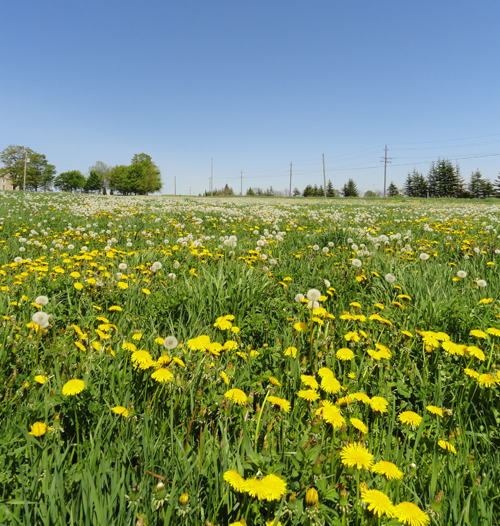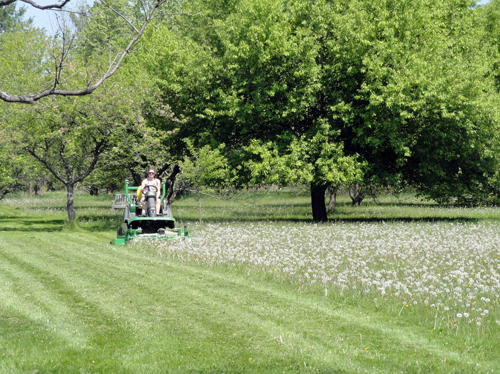
What grows faster in the spring – and is less wanted — than a dandelion? These spring sprinters will be harnessed this year by U of G researchers for a new project intended to teach evolution to high school students and acquaint them with Guelph research.
The Dandelion Evolution Outreach Program will be piloted this spring in local high schools by integrative and agricultural biologists at Guelph.
Grade 11 students will learn about evolution using study plots right outside their classroom windows.
Working in their schoolyards, they will study whether mowing changes how fast dandelions grow and how early the plants make seeds – a demonstration of evolution in action, says Prof. Andrew McAdam, Integrative Biology.
“If the lawn mowers come around and chop off the tall flower heads of dandelions before they’re able to go to seed, will that lead to evolution of shorter dandelions that duck under the mowers or that produce seeds really quickly before the mower comes around on the next weekend?”

He came up with the idea for this natural schoolyard experiment about five years ago. McAdam was interested in reaching out to high school students with a tangible project in natural selection and human effects on evolution. He studies the evolution and ecology of red squirrels in Yukon.
“It was a great backyard science story they could take part in. I want to get to these students and let them appreciate the excitement of discovery for themselves.”
This year, he teamed up with Prof. Rene Van Acker, Plant Agriculture, and integrative biology professor Shoshanah Jacobs to try out the idea.
For the pilot study, they will work with about 200 students at six schools in the Upper Grand District School Board.
Sue Bender, the board’s secondary curriculum leader, says the project will give students “a real opportunity to actively participate in the scientific process hands-on.”
Unlike simulations in the classroom, she adds, “this is that direct embedded-in-the-community experience. It’s not so specific to dandelions. They’re a simple tool by which to experience science. The experience of the science is really at the main root of it.”
Students will track how often plots are mowed, measure dandelion heights and collect seeds. Those seeds will be grown in U of G greenhouses, where biologists will monitor flowering and growth rates.
The project will help students learn about the scientific method, including making a hypothesis, testing a prediction and running an experiment.
Jacobs says the project offers a peek into biology, genetics and evolution, and how humans can affect genetic biodiversity and change. “It provides exciting interdisciplinary challenges and opportunities,” she says.
Ultimately, the team aims to develop kits for high school biology teachers to run the dandelion evolution unit themselves. They also hope to widen the project to other schools in Ontario.
Van Acker will run control plots at U of G’s Simcoe Research Station. A weed scientist, he’s looked at reproductive biology of dandelions and their management in field crops.
Besides learning more about turf weed management, he says, “I’m interested in working with Shoshanah. Her ideas of exploring species evolution are interesting to me academically. I’m also interested in seeing the success she will have in engaging students in this citizen-science approach.”
He says that approach will only become more popular, as researchers look for ways to engage the public in collecting larger amounts of data for various studies.
“It’s also a very good profile for the University,” says Van Acker, associate dean external relations with the Ontario Agricultural College. “It raises awareness among high school students of the programs available at the University of Guelph, the kind of work we do. It’s probably a good recruiting tool.”